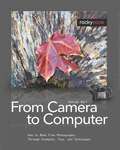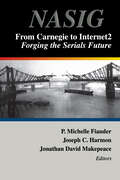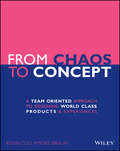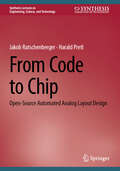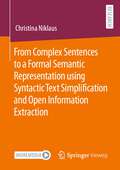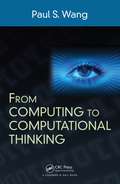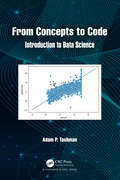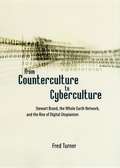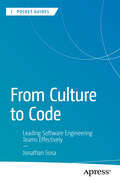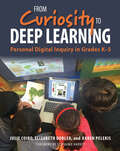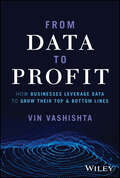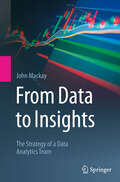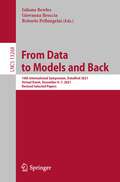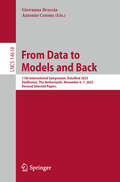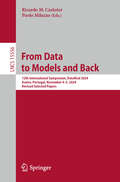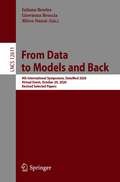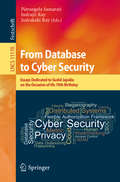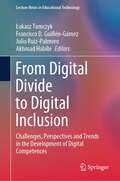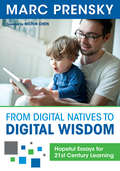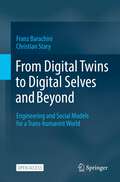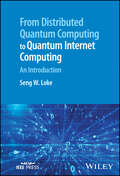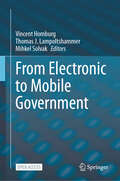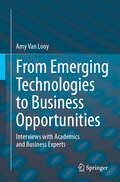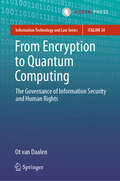- Table View
- List View
From Camera to Computer
by George BarrEver wonder what it would be like to get inside the head of an accomplished photographer as he chooses a subject, works the scene, selects an image, and then edits the result into a piece of photographic art? As a follow-up to his successful first book Take Your Photography To The Next Level, author/photographer George Barr now applies the practice to the theory. Go along with George as he searches for subjects, sorts out scenes, refines his composition, and then moves from Camera to Computer to edit his images, not only correcting flaws, but making the images match his vision. You'll see proof sheets and "not quite there" images, and you'll learn tips on image editing from someone who is focused on creating a fine art image rather than mass producing many similar images-often the goal of commercial photographers. With his friendly, easy-to-understand approach George goes beyond how to edit your images by teaching the whys behind the editing process. This book is certain to help you dramatically improve your own images. Topics include: Finding photographic subjects Working the scene Practical issues in composition What to change in a captured image How to edit your images-a practical, easy workflow
From Carnegie to Internet2: Forging the Serial's Future
by P. Michelle Flander Joseph C. Harmon Jonathan David MakepeaceCouldn't attend the conference? Pick up the book!The Internet has been called a revolution, and it is; both in the ways that people and institutions communicate with each other, and in the ways that resources can now be shared. Professionals in the information field share a mandate to enable current and future generations to make use of this technology.From Carnegie to Internet2: Forging the Serial's Future is derived from proceedings of NASIG's 14th Annual Conference, held in June 1999 in Pittsburgh, Pennsylvania. This comprehensive guide to the conference proceedings discusses the powerful impact that the current explosion of information technology has had on librarianship and shares information to help you understand and benefit from these new tools.From Carnegie to Internet2 begins with a discussion of metadata--how it is created, how it is used and misused, and how to access it through search engines, including current and future access to electronic serials. Next, you'll encounter a proactive process for looking at what's to come for your library in “Scenario Building: Creating Your Library's Future.”As you proceed through From Carnegie to Internet2 you will find fascinating discussions of: full-text databases electronic serials reliable and unreliable Web sources the history of librarianship scholarly publishing by librarians the evolution of distance education . . . and much more! The current information and practical insight in From Carnegie to Internet2 will help you improve your technical skills and prepare you and your library for the 21st century!
From Chaos to Concept: A Team Oriented Approach to Designing World Class Products and Experiences
by Kevin Collamore BraunThis book is written for product design, software development, graphic design, and UX professionals with a focus on creating measurably better user experiences. If you want to design solutions to meet business goals and delight your users, you can look to this resource which covers the following areas: Creating and documenting goals, strategies, objectives, and tactics Defining or refining personas based on your measurable objectives (OKRs) Creating and iterating on scenarios based your prioritized personas A team approach to defining the product and roadmap to address critical use cases Team based divergent ideation and solution exploration Team based convergent solution definition Wireframing potential solutions for rapid research and iteration Using quantitative and qualitative methods to understand usage and test with users Exploring approaches to taxonomy and information architecture Using psychology and human factors to drive your design decisions Developing performant, accessible, maintainable experiences Using analytics to measure the results and inform the next iteration How this process differs based on the size of the company or team that is employing it
From Click to Boom: The Political Economy of E-Commerce in China (Princeton Studies in Contemporary China)
by Lizhi LiuHow the world&’s largest e-commerce market highlights a digital path to developmentHow do states build vital institutions for market development? Too often, governments confront technical or political barriers to providing the rule of law, contract enforcement, and loan access. In From Click to Boom, Lizhi Liu examines a digital solution: governments strategically outsourcing tasks of institutional development and enforcement to digital platforms—a process she calls &“institutional outsourcing.&”China&’s e-commerce boom showcases this digital path to development. In merely two decades, China built from scratch a two-trillion-dollar e-commerce market, with 800 million users, seventy million jobs, and nearly fifty percent of global online retail sales. Contrary to conventional wisdom, Liu argues, this market boom occurred because of weak government institutions, not despite them. Gaps in government institutions compelled e-commerce platforms to build powerful private institutions for contract enforcement, fraud detection, and dispute resolution. For a surprisingly long period, the authoritarian government acquiesced, endorsed, and even partnered with this private institutional building despite its disruptive nature. Drawing on a plethora of interviews, original surveys, proprietary data, and a field experiment, Liu shows that the resulting e-commerce boom had far-reaching effects on China.Institutional outsourcing nonetheless harbors its own challenges. With inadequate regulation, platforms may abuse market power, while excessive regulation stifles institutional innovation. China&’s regulatory oscillations toward platforms—from laissez-faire to crackdown and back to support—underscore the struggle to strike the right balance.
From Code to Chip: Open-Source Automated Analog Layout Design (Synthesis Lectures on Engineering, Science, and Technology)
by Jakob Ratschenberger Harald PretlThis book shows how the layout of an analog circuit can be automatically generated in a fully open-source way. Based on an exemplary design flow, it introduces and explains the necessary steps for transforming a SPICE netlist into a layout, which can be inspected by the open-source layout editor Magic VLSI. This is done by using the industry’s first open-source process design kit SKY130. Furthermore, the implementation of the design flow in the programming language Python is available as open-source on GitHub.
From Complex Sentences to a Formal Semantic Representation using Syntactic Text Simplification and Open Information Extraction
by Christina NiklausThis work presents a discourse-aware Text Simplification approach that splits and rephrases complex English sentences within the semantic context in which they occur. Based on a linguistically grounded transformation stage, complex sentences are transformed into shorter utterances with a simple canonical structure that can be easily analyzed by downstream applications. To avoid breaking down the input into a disjointed sequence of statements that is difficult to interpret, the author incorporates the semantic context between the split propositions in the form of hierarchical structures and semantic relationships, thus generating a novel representation of complex assertions that puts a semantic layer on top of the simplified sentences. In a second step, she leverages the semantic hierarchy of minimal propositions to improve the performance of Open IE frameworks. She shows that such systems benefit in two dimensions. First, the canonical structure of the simplified sentences facilitates the extraction of relational tuples, leading to an improved precision and recall of the extracted relations. Second, the semantic hierarchy can be leveraged to enrich the output of existing Open IE approaches with additional meta-information, resulting in a novel lightweight semantic representation for complex text data in the form of normalized and context-preserving relational tuples.
From Computing to Computational Thinking
by Paul WangComputational Thinking (CT) involves fundamental concepts and reasoning, distilled from computer science and other computational sciences, which become powerful general mental tools for solving problems, increasing efficiency, reducing complexity, designing procedures, or interacting with humans and machines. An easy-to-understand guidebook, From Computing to Computational Thinking gives you the tools for understanding and using CT. It does not assume experience or knowledge of programming or of a programming language, but explains concepts and methods for CT with clarity and depth. Successful applications in diverse disciplines have shown the power of CT in problem solving. The book uses puzzles, games, and everyday examples as starting points for discussion and for connecting abstract thinking patterns to real-life situations. It provides an interesting and thought-provoking way to gain general knowledge about modern computing and the concepts and thinking processes underlying modern digital technologies.
From Concepts to Code: Introduction to Data Science
by Adam P. TashmanThe breadth of problems that can be solved with data science is astonishing, and this book provides the required tools and skills fot a broad audience. The reader takes a journey into the forms, uses, and abuses of data and models, and learns how to critically examine each step. Python coding and data analysis skills are built from the ground up, with no prior coding experience assumed. The necessary background in computer science, mathematics, and statistics is provided in an approachable manner.Each step of the machine learning lifecycle is discussed, from business objective planning to monitoring a model in production. This end-to-end approach supplies the broad view necessary to sidestep many of the pitfalls that can sink a data science project. Detailed examples are provided from a wide range of applications and fields, from fraud detection in banking to breast cancer classification in healthcare. The reader will learn the techniques to accomplish tasks that include predicting outcomes, explaining observations, and detecting patterns. Improper use of data and models can introduce unwanted effects and dangers to society. A chapter on model risk provides a framework for comprehensively challenging a model and mitigating weaknesses. When data is collected, stored, and used, it may misrepresent reality and introduce bias. Strategies for addressing bias are discussed. From Concepts to Code: Introduction to Data Science leverages content developed by the author for a full-year data science course suitable for advanced high school or early undergraduate students. This course is freely available and it includes weekly lesson plans.
From Counterculture to Cyberculture: Stewart Brand, the Whole Earth Network, and the Rise of Digital Utopianism
by Fred TurnerIn the early 1960s, computers haunted the American popular imagination. But by the 1990s - and the dawn of the Internet - computers started to represent a very different kind of world.
From Culture to Code: Leading Software Engineering Teams Effectively (Apress Pocket Guides)
by Jonathan SosaThis book is a comprehensive guide written for software engineering professionals who are, or aspire to be, in leadership positions. It begins with essential soft skills, teaching you how to build an influential presence, make confident decisions, guide teams through challenges, and inspire excellence by setting high standards. It continues with sections on acquiring talent, managing, and supporting your team. Learn to write job descriptions that attract top talent, set up a smooth hiring pipeline, and seamlessly onboard new hires. Discover how to structure teams to minimize cognitive load and foster collaboration. Gain actionable insights into goal-setting, including defining OKRs, tracking progress, setting clear expectations, and conducting meaningful evaluations to recognize top performers and support growth. In the final section, the book delves into the technical aspects of leadership. Explore how to choose the right tech stack, establish coding standards, and manage technical debt effectively. Additional chapters offer guidance on evaluating Agile practices, setting clear communication protocols, and balancing quality with delivery speed. Also packed with technical actionable advice from two decades of real-world experience, this book equips you to lead with confidence and drive impactful results. What You Will Learn - How to transition from individual contributor to a leadership position - How to develop your presence, influence, and make difficult decisions - How to craft attractive job descriptions, identify, interview, and hire top talent - How to set expectations, evaluate performance, and promote deserving employees - How to deliver effective feedback - What best practices to introduce to your teams - How to deliver high-quality, impactful software projects Who This Book is For Senior Engineering Managers, Director of Engineering, VP of Engineering, and CTOs. And software engineering professionals who aspire to be in these positions.
From Curiosity to Deep Learning: Personal Digital Inquiry in Grades K-5
by Julie Coiro Elizabeth Dobler Karen PelekisFrom Curiosity to Deep Learning: Personal Digital Inquiry in Grades K-5 reveals the powerful learning that results when you integrate purposeful technology into a classroom culture that values curiosity and deep learning. The centerpiece of this practical guide is Personal Digital Inquiry (PDI), a framework developed by Julie Coiro and implemented in classrooms by her co-authors, Elizabeth Dobler and Karen Pelekis. Clear, detailed examples offer ideas for K-5 teachers and school librarians to support their teaching.Personal emphasizes the significance of the personal relationship between teachers and students, and the role that students have in the learning process. Digital reflects the important role that digital texts and tools have come to play in both learning and teaching with inquiry. Inquiry lies at the core of PDI, because learners grow and change with opportunities to identify problems, generate personal wonderings, and engage in collaborative dialogue, making learning relevant and lasting.From Curiosity to Deep Learning: Personal Digital Inquiry in Grades K-5 shows you how to integrate inquiry with a range of digital tools and resources that will create a dynamic classroom for both you and your students.
From Data To Profit: How Businesses Leverage Data to Grow Their Top and Bottom Lines
by Vin VashishtaTransform your company’s AI and data frameworks to unlock the true power of disruptive new tech In From Data to Profit: How Businesses Leverage Data to Grow Their Top and Bottom Lines, accomplished entrepreneur and AI strategist Vineet Vashishta delivers an engaging and insightful new take on making the most of data, artificial intelligence, and technology at your company. You’ll learn to change the culture, strategy, structure, and operational framework of your company to take full advantage of disruptive advances in tech. The author explores fascinating work being undertaken by firms in the real world, as well as high-value use cases and innovative projects and products made possible by realigning organizational frameworks using the capabilities of new technologies. He explains how to get everyone in your company on the same page, following a single framework, in a way that ensures individual departments get what they want and need. You’ll learn to outline a comprehensive technical vision and purpose that respects departmental autonomy over their core competencies while guaranteeing that they all get the tools they need to make technology their partner. You’ll also discover why firms that have adopted a holistic strategy toward AI and data have enjoyed results far beyond those experienced by those that have taken a piecemeal approach. From Data to Profit demonstrates the proper role of the CEO during an intensive transformation: one of maintaining culture during the change. It offers advice for organizational change, including the 3-Phase Data Organizational Development Framework, the Core Rim 3 Main People Groups Framework, and the way to implement new roles for a Chief Digital Officer and Technical Strategist. Perfect for data professionals, data organizational leaders, and data product and process owners, From Data to Profit will also benefit executives, managers, and other business leaders seeking hands-on advice for digital transformation at their firms.
From Data to Insights: The Strategy of a Data Analytics Team
by John MackayFrom Data to Insights is a practical guide to building a strategy that addresses the common issues faced by Data Analytics teams. Not enough time, too many requests, unhappy stakeholders, and colleagues with low team morale are just some of the problems caused by poor strategy and design. This guide will help managers avoid these pitfalls and improve team performance by focusing on long-term goals and strategic planning, ensuring your Data Analytics team can effectively support their business and its stakeholders. Practical examples and explanations are provided to help understand how a Data Analytics team&’s strategy can be implemented and why certain approaches will or won&’t work.
From Data to Models and Back: 10th International Symposium, DataMod 2021, Virtual Event, December 6–7, 2021, Revised Selected Papers (Lecture Notes in Computer Science #13268)
by Juliana Bowles Giovanna Broccia Roberto PellungriniThis book constitutes the refereed proceedings of the 10th International Symposium "From Data Models and Back", DataMod 2021, which was held virtually during December 6-7, 2021, as a satellite event of SEFM 2021. The 9 full papers and 1 short paper included in this book were carefully reviewed and selected from 12 submissions. They were organized in topical sections as follows: Model verification; data mining and processing related approaches; and other approaches.
From Data to Models and Back: 11th International Symposium, DataMod 2023, Eindhoven, The Netherlands, November 6–7, 2023, Revised Selected Papers (Lecture Notes in Computer Science #14618)
by Antonio Cerone Giovanna BrocciaThis book constitutes the refereed proceedings of the 11th International Symposium on From Data to Models and Back, DataMod 2023, held in Eindhoven, The Netherlands during November 6–7, 2023. The 8 full papers presented were carefully reviewed and selected from 10 submissions. They were organized in topical sections as follows: domain-specific modeling and analysis; system biology; formal methods in healthcare; and natural language processing.
From Data to Models and Back: 12th International Symposium, DataMod 2024, Aveiro, Portugal, November 4–5, 2024, Revised Selected Papers (Lecture Notes in Computer Science #15556)
by Paolo Milazzo Ricardo M. CzeksterThis book constitutes revised selected papers of the 12th International Symposium on From Data Models and Back, DataMod 2024, held in Aveiro, Portugal, during November 4–5, 2024. The 9 full papers included in this book were carefully reviewed and selected from 15 submissions. These papers present research results in the areas of knowledge management, data mining and machine learning, as well as application experiences, tools and promising preliminary ideas.
From Data to Models and Back: 9th International Symposium, DataMod 2020, Virtual Event, October 20, 2020, Revised Selected Papers (Lecture Notes in Computer Science #12611)
by Juliana Bowles Giovanna Broccia Mirco NanniThis book constitutes the refereed proceedings of the 9th International Symposium on From Data Models and Back, DataMod 2020, held virtually, in October 2020. The 11 full papers and 3 short papers presented in this book were selected from 19 submissions. The papers are grouped in these topical sections: machine learning; simulation-based approaches, and data mining and processing related approaches.
From Database to Cyber Security: Essays Dedicated to Sushil Jajodia on the Occasion of His 70th Birthday (Lecture Notes in Computer Science #11170)
by Indrajit Ray Pierangela Samarati Indrakshi RayThis Festschrift is in honor of Sushil Jajodia, Professor in the George Mason University, USA, on the occasion of his 70th birthday. This book contains papers written in honor of Sushil Jajodia, of his vision and his achievements. Sushil has sustained a highly active research agenda spanning several important areas in computer security and privacy, and established himself as a leader in the security research community through unique scholarship and service. He has extraordinarily impacted the scientific and academic community, opening and pioneering new directions of research, and significantly influencing the research and development of security solutions worldwide. Also, his excellent record of research funding shows his commitment to sponsored research and the practical impact of his work.The research areas presented in this Festschrift include membrane computing, spiking neural networks, phylogenetic networks, ant colonies optimization, work bench for bio-computing, reaction systems, entropy of computation, rewriting systems, and insertion-deletion systems.
From Digital Divide to Digital Inclusion: Challenges, Perspectives and Trends in the Development of Digital Competences (Lecture Notes in Educational Technology)
by Łukasz Tomczyk Francisco D. Guillén-Gámez Julio Ruiz-Palmero Akhmad HabibiThis book offers an expert perspective on two key phenomena in the development of the information society, namely digital inclusion and digital exclusion. Despite the intensive digitalization of various areas in human activity, the lack of proper information and communications technology (ICT) literacy, the lack of access to high-speed Internet, and the still unsatisfactory level of e-services are a reality in many regions and countries. This edited book presents a unique overview of research related to the dynamics of digital exclusion and the development of digital competences, as well as an analysis of the most effective educational solutions to foster the digital inclusion of disadvantaged groups. This book is particularly useful for educators dealing with the topic of digital exclusion and inclusion and who are looking for knowledge on enhancing digital competences in disadvantaged groups. It is also helpful for social policy makers involved in designing solutions to minimize various forms of digital exclusion. Finally, this book serves as a reference for academics and students from the disciplines of pedagogy, social policy, new media psychology, media sociology, and cultural anthropology.
From Digital Natives to Digital Wisdom: Hopeful Essays for 21st Century Learning
by Marc R. PrenskyAn expert perspective on 21st century education What can you learn on a cell phone? Almost anything! How does that concept fit with our traditional system of education? It doesn’t. Best-selling author and futurist Marc Prensky’s book of essays challenges educators to “reboot” and make the changes necessary to prepare students for 21st century careers and living. His “bottom-up” vision includes students’ ideas about what they need from teachers, schools, and education. Also featured are easy-to-do, high-impact classroom strategies that help students acquire “digital wisdom.” This thought-provoking text is organized into two sections that address: Rethinking education (including what and how we teach and measuring learning) 21st century learning and technology in the classroom (including games, YouTube, and more)
From Digital Twins to Digital Selves and Beyond: Engineering and Social Models for a Trans-humanist World
by Christian Stary Franz BarachiniThis open access book aims at deepening the understanding of the relation between cyber-physical systems (CPSs) as socio-technical systems and their digital representations with intertwined artificial intelligence (AI). The authors describe why it is crucial for digital selves to be able to develop emotional behavior and why a humanity-inspired AI is necessary so that humans and humanoids can coexist. The introductory chapter describes major milestones in computer science which form the basis for the implementation of digital twins and digital selves. The subsequent Part I then lays the foundation to develop a socio-technical understanding of the nature of digital twins as representations and trans-human development objects. Following the conceptual understanding of digital twins and how they could be engineered according to cognitive and organizational structures, Part II forms the groundwork for understanding social behavior and its modeling. It discusses various perception-based socio-emotional approaches before sketching behavior-relevant models and their simulation capabilities. In particular, it is shown how emotions can substantially influence the collective behavior of artificial actors. Part III eventually presents a symbiosis showing under which preconditions digital selves might construct and produce digital twins as integrated design elements in trans-human ecosystems. The chapters in this part are dedicated to opportunities and modes of co-creating reflective socio-trans-human systems based on digital twin models, exploring mutual control and continuous development. The final epilog is congenitally speculative in its nature by presenting thoughts on future developments of artificial life in computational substrates. The book is written for researchers and professionals in areas like cyber-physical systems, robotics, social simulation or systems engineering, interested to take a speculative look into the future of digital twins and autonomous agents. It also touches upon philosophical aspects of digital twins, digital selves and humanoids.
From Distributed Quantum Computing to Quantum Internet Computing: An Introduction
by Seng W. LokeFrom Distributed Quantum Computing to Quantum Internet Computing Understand the future of the internet with this accessible guide Quantum computing, which draws upon the principles of quantum mechanics to perform computing functions unrestricted by the binary language of ordinary computing, has developed with extraordinary speed in recent years. Progress in quantum computing and its related technological subfields, including quantum internet, has been rapid enough to suggest that we are living in a “new Quantum Age.” To understand the future of the internet, it’s now essential to understand the present and future of quantum computing and quantum internet computing. This book provides a groundbreaking overview of this field of technology and its latest developments. It provides readers with a working knowledge of the key topics required to connect quantum computing to the future of distributed computing and the internet, including important issues like quantum protocols, distributed quantum computations, fundamental computations in the quantum internet architecture, and more. The result is an accessible and essential reference for any reader looking to better understand quantum technologies. From Distributed Quantum Computing to Quantum Internet Computing readers will also find: Detailed discussion of topics including qubit states, entanglement, quantum gates, and more. Mathematical background for underlying key concepts. Worked out examples that aim to initiate readers into the emerging area of quantum internet computing. This book is ideal for researchers and graduate students in quantum computing, quantum internet, quantum communications, and related fields, as well as Computer Scientists and Information Technology students and researchers who want an introductory overview to quantum internet computing.
From Electronic to Mobile Government
by Vincent Homburg Thomas J. Lampoltshammer Mihkel SolvakThe open access book combines insights from policy sciences (backgrounds of cross-border coordination challenges), design science (development of architectures for mobile services), information ethics (privacy and security of e-government services in international arenas) and business studies (changes in existing business models). The notably interdisciplinary character provides scholars and policy professionals working in specific (legal, political, engineering) disciplines a unique outlook on how policy making, implementation, and pilots are related in multi-level and cross-border governance. The book presents the results of the EU-funded “Mobile Cross-Border Government Services for Europe” (mGov4EU) project in which various pilots implemented and validated enhanced infrastructure services for electronic voting, smart mobility, and mobile signing. Together, the single pilots demonstrated how enhanced electronic identities and trust services (eIDAS) and Single Digital Gateway Regulation (SDGR) layers can accommodate once-only, digital-by-default and mobile-first principles. By taking advantage of security features of modern smartphones like hardware-backed secure elements together with integrated convenience elements like biometric sensors, this research showed how both the security needs and data-protection expectations one has into public services and the usability challenges that arise when accessing complex services using constrained mobile devices meet. This book is the first one in his kind to address this gap in the academic knowledge, as well as this gap in available compendiums for policy professionals at European levels of decision-making, as well as for policymakers and experts working on electronic identification, cross-border and cross-sector information exchange in the various member states of the European Union. This way, it serves various audiences: first, researchers in informatics-related areas like information systems, electronic government, and mobile applications, as it describes empirical examples of secure, easy-to-use and cross-border electronic services that have been developed and successfully tested in practice. Second, it also caters to researchers in international relations or political science as well as policymakers and politicians, both at national or European levels, who are involved in drafting policies and implementing European initiatives in relation to the building blocks of next-generation e-government services.
From Emerging Technologies to Business Opportunities: Interviews with Academics and Business Experts
by Amy Van LooyThis book provides an up-to-date overview and critical discussion of technologies that shape and influence the digital economy, and especially covers artificial intelligence, Internet of Things, virtual and augmented reality, digital twins, blockchain technology, 3D printing, and biochip technology. After two introductory chapters about the digital economy and digital technologies in general, dedicated chapters explain the basics and foundations of each of the selected technologies as well as their potential for industry and services. To this end, these chapters first introduce the specific digital technology, followed by one interview with an academic expert for further describing and explaining the technology plus a second one with a business expert for illustrating a successful business case. Each chapter ends with a recap of the takeaways, supplemented by links to further readings for those who are eager to delve more into the relative topic as well as a self-test to challenge the reader’s understanding. The book mainly targets business professionals and advanced undergraduate students in business and computer science. Business professionals (ranging from employees to managers and executives) will become acquainted with the basic terminology and diverse business aspects related to emerging digital technologies. They will benefit from descriptions by academic leaders in the field along with information and advice from industry people. Students will get an overview of the most important technologies which may also help them in selecting the most promising topics in their further education.
From Encryption to Quantum Computing: The Governance of Information Security and Human Rights (Information Technology and Law Series #38)
by Ot van DaalenThis book examines the implications of information security which plays such an important role in modern digital infrastructure. Information security technologies restrict the (mis)use of this infrastructure, while also constantly being probed by researchers, intelligence agencies and criminals. One can see this cycle of making and breaking everywhere in the digital sphere. An important example of this cat-and-mouse game is the development of quantum computers, which may in the near future break some widely used encryption technologies. This cycle also has implications for human rights: weakening encryption may affect privacy, for example. But the relationship between human rights and information security has not been investigated in-depth before. In this study, state obligations relating to information security are analysed under the European Convention for Human Rights and the EU Charter for Fundamental Rights, focusing on issues as human rights-compatible encryption policy, on how governments should deal with vulnerabilities in software, and whether governments can curtail the development and export of quantum computers. This book analyses the human rights-compatibility of quantum computing governance and offers unique insights into the connection between human rights and information security that will be relevant for legal practitioners, policy-makers and academics involved in this field of research. Ot van Daalen is Assistant Professor at the Institute for Information Law (IViR), Faculty of Law of the University of Amsterdam, the Netherlands.
